- Home
- Ken Follett
The Evening and the Morning Page 9
The Evening and the Morning Read online
Page 9
Ragna listened patiently while Gaston explained why he had borrowed from Bernard and what difficulties he had paying him back. Along the way, a variety of barely relevant issues were raised: perceived insults to one another, wives’ insults to other wives, disputes about which words had been uttered and in what tone of voice. Ragna let it run. They needed to vent their anger. But finally she called a halt.
“I’ve heard enough,” she said. “This is my decision. First, Gaston owes my father, the count, two year-old calves. No excuses. He was wrong to withhold them. He will not be punished for his transgression, because he was provoked; but what he owes, he owes.”
They received that with mixed reactions. Some muttered disapprovingly, others nodded agreement. Gaston’s face was a mask of injured innocence.
“Second, Bernard is responsible for the deaths of two of Gaston’s calves. Gaston’s unpaid debt does not excuse Bernard’s transgression. So Bernard owes Gaston two calves. However, Gaston already owed one calf to Bernard, so that leaves only one calf to pay.”
Now Bernard looked shocked. Ragna was being tougher than the people had expected. But they did not protest: her decisions were lawful.
“Finally, this dispute should not have been allowed to fester, and the blame for that lies with Gerbert.”
Gerbert said indignantly: “My lady, may I speak?”
“Certainly not,” said Ragna. “You’ve had your chance. It’s my turn now. Be silent.”
Gerbert clammed up.
Ragna said: “Gerbert is the reeve and should have resolved it long ago. I believe he was persuaded not to do so by his wife, Renée, who wanted him to favor her brother Bernard.”
Renée looked abashed.
Ragna went on: “Because all this is partly Gerbert’s fault, he will forfeit a calf. I know he’s got one, I saw it in his yard. He will give the calf to Bernard, who will give it to Gaston. And so debts are settled and wrongdoers are punished.”
She could tell instantly that the villagers approved of her judgment. She had insisted on obedience to the rules, but she had done it in a clever way. She saw them nodding to one another, some smiling, none objecting.
“And now,” she said, standing up, “you can give me a cup of your famous cider, and Gaston and Bernard can drink together and make friends.”
The buzz of conversation grew as everyone discussed what had happened. Father Louis came to Ragna and said: “Deborah was one of the judges of Israel. That’s how you got your nickname.”
“Correct.”
“She is the only female judge.”
“So far.”
He nodded. “You did that well.”
I’ve impressed him at last, Ragna thought.
They drank their cider and took their leave. Riding back to Cherbourg, Ragna asked Louis about Guillaume.
“He’s tall,” Louis said.
That might help, she thought. “What makes him angry?”
Louis’s glance told Ragna that he recognized the shrewdness of her question. “Nothing much,” he said. “Guillaume takes life phlegmatically, in general. He may get irritated when a servant is careless: food badly cooked, a saddle loosely strapped, rumpled bed linen.”
He sounded persnickety, Ragna thought.
“He’s very well thought of at Orléans,” Louis went on. Orléans was the main seat of the French court. “His uncle, the king, is fond of him.”
“Is Guillaume ambitious?”
“No more than is usual in a young nobleman.”
A wary response, Ragna thought. Either Guillaume was ambitious to a fault, or the reverse. She said: “What is he interested in? Hunting? Breeding horses? Music?”
“He loves beautiful things. He collects enameled brooches and embellished strap ends. He has good taste. But you haven’t asked me what I thought might have been a girl’s first question.”
“What’s that?”
“Whether he’s handsome.”
“Ah,” said Ragna, “on that matter I must make my own judgment.”
As they rode into Cherbourg, Ragna noticed that the wind had changed. “Your ship will sail this evening,” she said to Aldred. “You have an hour before the tide turns, but you’d better get on board.”
They returned to the castle. Aldred retrieved his box of books. Louis and Ragna went with him as he walked Dismas down to the waterfront. Aldred said: “It’s been a delight meeting you, Lady Ragna. If I’d known there were girls like you, perhaps I wouldn’t have become a monk.”
It was the first flirtatious remark he had made to her, and she knew right away that he was merely being polite. “Thank you for the compliment,” she said. “But you would have become a monk anyway.”
He smiled ruefully, clearly understanding what she was thinking.
Ragna would probably never see him again, which was a shame, she thought.
A ship was coming in on the tail of the tide. It looked like an English fishing vessel, she thought. The crew furled the sail and the ship drifted toward the shore.
Aldred went on board his chosen vessel with his horse. The crew were already untying the ropes and raising the anchor. Meanwhile, the English fishing boat was doing the reverse.
Aldred waved to Ragna and Louis as the ship began to float away from land on the turning tide. At the same time, a small group of men disembarked from the newly arrived vessel. Ragna looked at them with idle curiosity. They had big mustaches but no beards, which marked them as English.
Ragna’s eye was drawn to the tallest of them. Aged about forty, he had a thick mane of blond hair. A blue cloak, ruffled now by the breeze, was fastened across his broad shoulders by an elaborate silver pin; his belt had a highly decorated silver buckle and strap end; and the hilt of his sword was encrusted with precious stones. English jewelers were the best in Christendom, Ragna had been told.
The Englishman walked with a confident stride, and his companions hurried to keep up. He came straight toward Ragna and Louis, no doubt guessing from their clothes that they were people of importance.
Ragna said: “Welcome to Cherbourg, Englishman. What brings you here?”
The man ignored her. He bowed to Louis. “Good day, Father,” he said in poor French. “I have come to speak with Count Hubert. I am Wilwulf, ealdorman of Shiring.”
* * *
Wilwulf was not handsome in the way Aldred was handsome. The ealdorman had a big nose and a jaw like a shovel, and his hands and arms were disfigured by scars. But all the maids in the castle blushed and giggled when he strode past. A foreigner was always intriguing, but Wilwulf’s attraction was more than that. It had to do with his size and the loose-limbed way he walked and the intensity of his gaze. Most of all, he had a self-confidence that seemed ready for anything. A girl felt that at any moment he might effortlessly pick her up and carry her off.
Ragna was intrigued by him, but he seemed supremely unaware of her or any of the women. He spoke to her father and to visiting Norman noblemen, and he chatted to his men-at-arms in fast, guttural Anglo-Saxon that Ragna could not understand; but he hardly ever spoke to women. Ragna felt slighted: she was not used to being ignored. His indifference was a challenge. She felt she had to get under his skin.
Her father was less enchanted. He was not inclined to take the side of the English against the Vikings, who were his uncivilized kinsmen. Wilwulf was wasting his time here.
Ragna wanted to help Wilwulf. She felt little affinity with Vikings and sympathized with their victims. And if she helped him, perhaps he would stop ignoring her.
Although Count Hubert had little interest in Wilwulf, a Norman nobleman had a duty to show hospitality, so he organized a boar hunt. Ragna was thrilled. She loved the hunt, and perhaps this would prove a chance to get to know Wilwulf better.
The party assembled by the stables at first light and took a standing breakfast of lamb cutl
ets and strong cider. They chose their weapons: any could be used, but the most favored was a special heavy spear with a long blade and a handle of equal length, and between the two a crossbar. They mounted, Ragna on Astrid, and set off on horseback with a pack of hysterically excited dogs.
Her father led the way. Count Hubert resisted the temptation of many small men to compensate by riding a big horse. His favorite hunting mount was a sturdy black pony called Thor. In the woods it was just as fast as a larger beast, but more nimble.
Wilwulf rode well, Ragna noticed. The count had given the Englishman a spirited dappled stallion called Goliath. Wilwulf had mastered the horse effortlessly, and sat as easily as if in a chair.
A packhorse followed the hunt with panniers full of bread and cider from the castle kitchen.
They rode to Les Chênes then turned into the Bois des Chênes, the largest remaining area of woodland in the peninsula, where the most wildlife could be found. They followed a track through the trees while the dogs quartered the ground frantically, snuffling in the undergrowth for the pungent scent of wild pig.
Astrid stepped lightly, enjoying the feeling of trotting through the woods in the morning air. Ragna felt mounting anticipation. The exhilaration was intensified by the danger. Boars were mighty, with big teeth and powerful jaws. A full-grown boar could bring down a horse and kill a man. They would attack even when wounded, especially if cornered. The reason that a boar spear had a crossbar was that without it an impaled boar might run up the spear and attack the hunter despite being fatally wounded. Hunting boar required a cool head and strong nerves.
One of the dogs picked up a scent, barked triumphantly, and headed off. The others followed in a pack, and the horsemen went after them. Astrid dodged between the thickets sure-footedly. Ragna’s young brother, Richard, passed her, riding overconfidently, as teenage boys did.
Ragna heard the gu-gu-gu screech of an alarmed boar. The dogs went wild and the horses picked up their pace. The chase was on, and Ragna’s heart beat faster.
Boars could run. They were not as fast as horses on cleared ground, but in the woods, zigzagging through the vegetation, they were hard to catch.
Ragna glimpsed the prey crossing a clearing in a group: a big female, five feet long from snout to tail tip, probably weighing more than Ragna herself; plus two or three smaller females and a clutch of little striped piglets that could go surprisingly fast on their short legs. Boar family groups were matriarchal: males lived separately except in the winter rutting season.
The horses loved the thrill of the chase, especially when riding at speed in a pack with the dogs. They crashed through the undergrowth, flattening shrubs and saplings. Ragna rode one-handed, holding the reins in her left while keeping her spear ready in her right. She lowered her head to Astrid’s neck to avoid overhanging branches, which could be more deadly than the boar to a careless rider. But although she rode prudently, she felt reckless, like Skadi, the Norse goddess of hunting, all-powerful and invulnerable, as if nothing bad could happen to her in this state of elation.
The hunt burst out of the woods into a pasture. Cows scattered, lowing, terrified. The horses caught up with the boar in moments. Count Hubert speared one of the lesser females, killing it. Ragna chased a dodging piglet, caught up, leaned down, and speared its hindquarters.
The old female turned dangerously, ready to fight back. Young Richard charged at her fearlessly, but his thrust was wild, and he stuck his spear into the heavily muscled hump. It penetrated only an inch or two then broke. Richard lost his balance and came off his horse, hitting the ground with a thump. The old female charged at him, and Ragna screamed in fear for her brother’s life.
Then Wilwulf came from behind, riding fast, spear raised. He jumped his horse over Richard then leaned perilously low and impaled the boar. The iron went through the beast’s throat into its chest. The point must have reached the heart, for the boar instantly fell dead.
The hunters reined in and dismounted, breathless and happy, congratulating one another. Richard was at first white-faced from his narrow escape, but the young men praised his bravery, and soon he was acting like the hero of the hour. The servants disemboweled the carcasses, and the dogs fell greedily on the guts that spilled onto the ground. There was a strong smell of blood and shit. A peasant appeared, silently furious, and herded his distressed cows into a neighboring field.
The packhorse with its panniers caught up, and the hunters drank thirstily and tore into the loaves.
Wilwulf sat on the ground with a wooden cup in one hand and a chunk of bread in the other. Ragna saw an opportunity to talk, and sat beside him.
He did not look particularly pleased.
She was accustomed to men being impressed with her, and his lack of interest pricked her pride. Who did he think he was? But she had a contrary streak, and now she wanted all the more to bring him under her spell.
She spoke in hesitant Anglo-Saxon. “You saved my brother. Thank you.”
He replied amiably enough. “Boys of his age need to take risks. Plenty of time to be cautious when he’s an old man.”
“If he lives that long.”
Wilwulf shrugged. “A timid nobleman gains no respect.”
Ragna decided not to argue. “Were you rash in your youth?”
His mouth twitched, as if his recollections amused him. “Utterly foolhardy,” he said, but it was more of a boast than a confession.
“Now you’re wiser, of course.”
He grinned. “Opinions differ.”
She felt she was breaking through his reserve. She moved to another topic. “How are you getting on with my father?”
His face changed. “He is a generous host, but he’s not inclined to give me what I came here for.”
“Which is . . . ?”
“I want him to stop sheltering Vikings in his harbor.”
She nodded. Her father had told her as much. But she wanted Wilwulf to talk. “How does that affect you?”
“They sail from here across the Channel to raid my towns and villages.”
“They haven’t troubled this coast for a century. And that’s not because we’re descended from Vikings. They no longer attack Brittany or the Frankish lands or the Low Countries. Why do they pick on England?”
He looked startled, as if he had not expected a strategic question from a girl. However, she had clearly raised a subject close to his heart, for he responded with heat. “We’re wealthy, especially our churches and monasteries, but we’re not good at defending ourselves. I’ve talked to learned men, bishops and abbots, about our history. The great King Alfred chased the Vikings off, but he was the only monarch to fight back effectively. England is a rich old lady with a box full of money and no one to guard it. Of course we get robbed.”
“What does my father say to your request?”
“I imagined that, as a Christian, he would readily agree to such a demand—but he has not.”
She knew that, and she had thought about it. “My father doesn’t want to take sides in a quarrel that doesn’t concern him,” she said.
“So I gathered.”
“Do you want to know what I would do?”
He hesitated, looking at her with an expression between skepticism and hope. Taking advice from a woman clearly did not sit easily with him. But his mind was not completely closed to the notion, she was glad to see. She waited, unwilling to force her views on him. Eventually he said: “What would you do?”
She had her answer ready. “I’d offer him something in return.”
“Is he so mercenary? I thought he would help us from fellow feeling.”
She shrugged. “You’re in a negotiation. Most treaties involve an exchange of benefits.”
His interest was heightened. “Perhaps I should think about that—giving your father some incentive for doing what I ask.”
“It’s
worth a try.”
“I wonder what he might want.”
“I could make a suggestion.”
“Go on.”
“Merchants here in Cherbourg sell goods to Combe, especially barrels of cider, wheels of cheese, and fine linen cloth.”
He nodded. “Often of high quality.”
“But we’re constantly obstructed by the authorities at Combe.”
He frowned in annoyance. “I am the authority at Combe.”
Ragna pressed on. “But your officials seem to be able to do anything they like. There are always delays. Men demand bribes. And there’s no knowing how much duty will be charged. In consequence, merchants avoid sending goods to Combe if they can.”
“Duty must be charged. I’m entitled to it.”
“But it should be the same every time. And there should be no delays and no bribes.”
“That would create difficulties.”
“More than a Viking raid?”
“Good point.” Wilwulf looked thoughtful. “Are you telling me that this is what your father wants?”
“No. I haven’t asked him, and I’m not representing him. He’ll speak for himself. I’m just offering you advice based on my close knowledge of him.”
The hunters were getting ready to depart. Count Hubert called: “We’ll go back past the quarry—there are sure to be more boar around there.”
Wilwulf said to Ragna: “I’ll think about this.”
They mounted and headed off. Wilwulf rode next to Ragna, not speaking, lost in thought. She was pleased with the conversation. She had got him interested at last.
The weather warmed up. The horses went faster, knowing they were on the way home. Ragna was beginning to think the hunt was over when she saw a patch of churned-up ground where the boar had been digging for roots and moles, both of which they liked to eat. Sure enough, the dogs picked up the scent.
They charged off again, horses following the dogs, and soon Ragna spotted the prey: a group of males this time, three or perhaps four. They ran through a copse of oak and beech and then divided, three heading along a narrow path and the fourth crashing through a thicket. The hunt followed the three, but Wilwulf went after the fourth, and Ragna did the same.

 The Pillars of the Earth
The Pillars of the Earth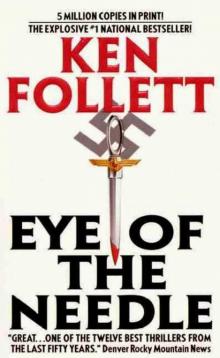 Eye Of The Needle
Eye Of The Needle Lie Down With Lions
Lie Down With Lions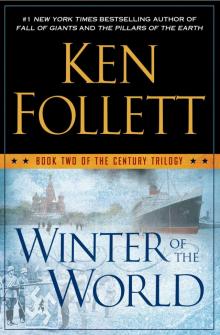 Winter of the World
Winter of the World Triple
Triple World Without End
World Without End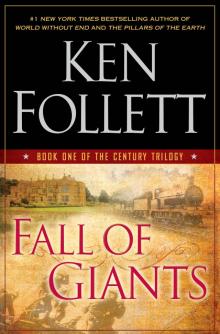 Fall of Giants
Fall of Giants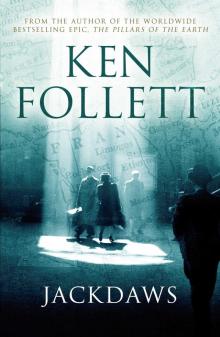 Jackdaws
Jackdaws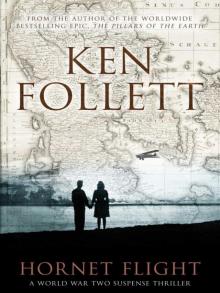 Hornet Flight
Hornet Flight Whiteout
Whiteout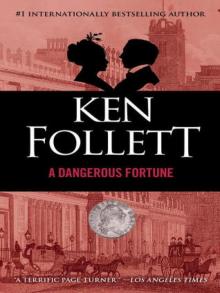 A Dangerous Fortune
A Dangerous Fortune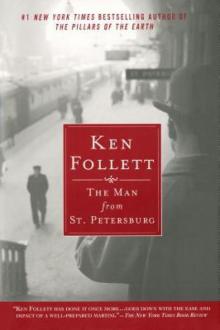 The Man From St. Petersburg
The Man From St. Petersburg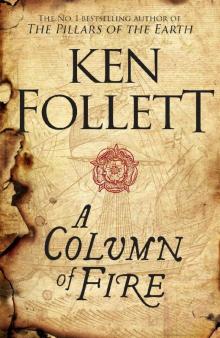 A Column of Fire
A Column of Fire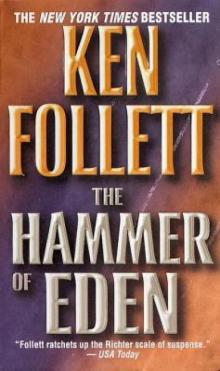 The Hammer of Eden
The Hammer of Eden On Wings of Eagles
On Wings of Eagles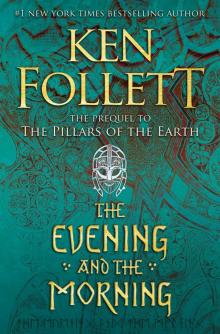 The Evening and the Morning
The Evening and the Morning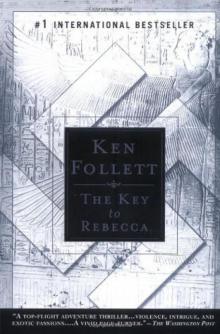 The Key to Rebecca
The Key to Rebecca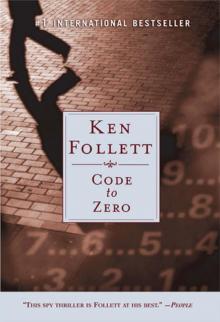 Code to Zero
Code to Zero Paper Money
Paper Money A Place Called Freedom
A Place Called Freedom The Modigliani Scandal
The Modigliani Scandal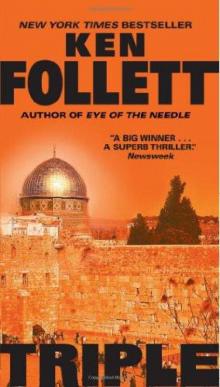 Triple (1991)
Triple (1991)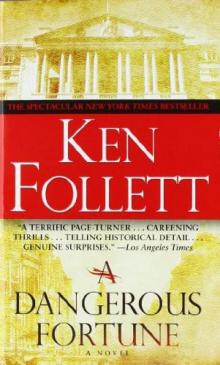 A Dangerous Fortune (1994)
A Dangerous Fortune (1994)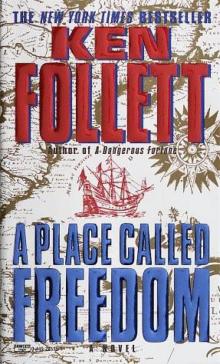 A Place Called Freedom (1995)
A Place Called Freedom (1995)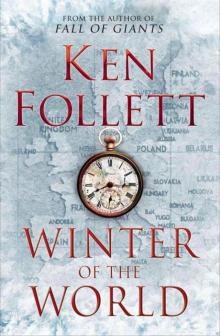 Winter of the World (Century Trilogy 2)
Winter of the World (Century Trilogy 2) Code to Zero (2000)
Code to Zero (2000)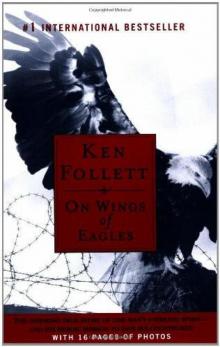 On Wings Of Eagles (1990)
On Wings Of Eagles (1990) Storm Island
Storm Island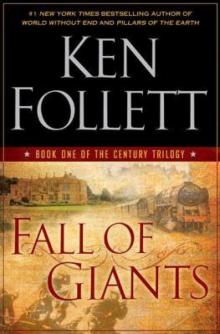 Fall of Giants (The Century Trilogy)
Fall of Giants (The Century Trilogy)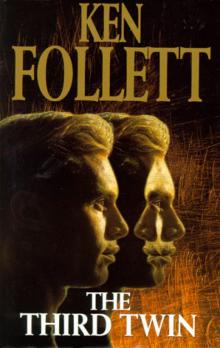 the Third Twin (1996)
the Third Twin (1996)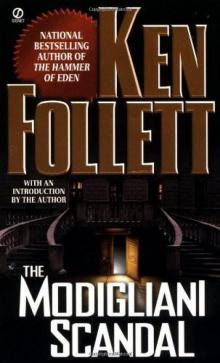 The Modigliani Scandal (1976)
The Modigliani Scandal (1976)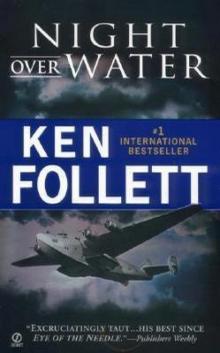 Night Over Water
Night Over Water